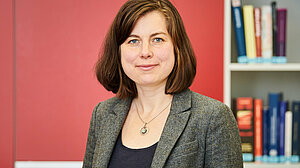Nadja Douglas: “The pandemic has exponentiated civic activism in Belarus”
Currently, Nadja Douglas’ research deals with police reform and citizen-police relations in Moldova and Armenia. Moreover, she focuses on the mobilisation of the society and the regime in Belarus. Her second research project concentrates on confidence-building measures in the Transdniestrian conflict settlement process.

What impact does the pandemic currently have on your work?
Besides my current ZOiS projects, I feel passionate about the topic of arms control and East-West relations. I recently wrote an article on NATO-Russia relations investigating what options remain to rebuild confidence. Much of it now appears somewhat obsolete. In other words, who cares about disarmament and negotiations to rebuild trust in the context of the Covid-19 pandemic crisis? In particular, the US and Russian administrations have in recent times become more inward looking and tend to deal with other supposedly more pressing problems, which is quite disillusioning.
How has Covid-19 influenced the objective of your research?
I have started to engage more closely with the current developments in Belarus. Compared to other countries in the region and Western Europe, the country has taken less proactive measures against Covid-19. I have been studying the mobilisation of Belarusian society already before the crisis. Interestingly, the pandemic has exponentiated civic activism in the country and revealed severe criticism towards the authorities for a lack of action, i.e. anti-crisis measures. Belarus has thus become an even more interesting case for me in order to study the phenomenon of state-society relations. However, also in Armenia civic activists have been extraordinarily creative and innovative to fight the disease and related consequences of the crisis. Unlike Belarus, they are doing this jointly with the government. The way law enforcement organs have been enforcing crisis-related restrictions in Moldova and Armenia is another aspect that I have been monitoring. Observing these current developments and drawing conclusions for my on-going research will continue to be exciting.
In your view, what are the most important long-term effects of Covid-19 in your region?
All countries in the Eastern Partnership region have been confronted with multiple problems even before the crisis. Belarus, for example, is currently at risk to be hit by a recession induced by economic problems of its most important partner Russia. This would come on top of the pandemic that presently has not yet been overcome. What makes Belarus more vulnerable is that it still faces an enormous reform backlog. Armenia, despite registering the highest number of SARS-CoV-2 infections in the South Caucasus, is currently probably experiencing lesser damage by the crisis. Moldova, by contrast, continues to be worn down by one domestic crisis following the next, the Covid-19 crisis exacerbating the situation. On the bottom line, none of the countries will emerge from the crisis unscathed.
Looking at the social sciences, how will the experience of the pandemic change how research is done in general?
The current crisis shows to us quite plainly that in the social sciences or any sciences we cannot assume the wild card of natural catastrophes or global pandemics to be an unlikely worst-case scenario anymore. On the contrary, they will become a more frequent reality. Our world has always been volatile. With globalisation, a regional crisis or epidemic can rapidly spread over the entire globe. That affects everything and all of a sudden, we have to question our prior premises or look at them under completely different auspices. This requires an enormous degree of flexibility and the capability to take into consideration new and different circumstances. It also means that the half-life period of research findings and insights is becoming shorter and shorter. Remains the question: How can we adapt our research and publishing, ideally without forfeiting objectivity and reliability?
Nadja Douglas is a researcher at ZOiS.